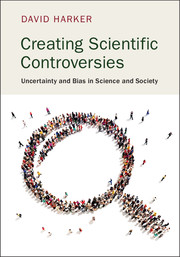Book contents
- Frontmatter
- Dedication
- Contents
- Preface
- Introduction: scientific authority and the created controversy
- Part I Lessons from the Philosophy of Science
- Part II Biases, Arguments and Created Controversies
- Part III Exposing Created Controversies
- 8 Environmental scare: the case of anthropogenic climate change
- 9 Sciences, religion and an intelligently designed controversy?
- 10 Issues of public health: AIDS, autism and GMOs
- Points to remember: Part III
- Concluding remarks
- References
- Index
9 - Sciences, religion and an intelligently designed controversy?
from Part III - Exposing Created Controversies
Published online by Cambridge University Press: 05 October 2015
- Frontmatter
- Dedication
- Contents
- Preface
- Introduction: scientific authority and the created controversy
- Part I Lessons from the Philosophy of Science
- Part II Biases, Arguments and Created Controversies
- Part III Exposing Created Controversies
- 8 Environmental scare: the case of anthropogenic climate change
- 9 Sciences, religion and an intelligently designed controversy?
- 10 Issues of public health: AIDS, autism and GMOs
- Points to remember: Part III
- Concluding remarks
- References
- Index
Summary
In 1999 the Kansas Board of Education was involved in what became a very public review of its standards of science education. Up for discussion, and piquing public interest, was what those standards would say about the teaching of biological evolution. Commenting on the case Phillip Johnson would later suggest: ‘What educators in Kansas and elsewhere should be doing is to “teach the controversy”’. Johnson was a law professor at U.C. Berkeley, author of Darwin on Trial, and co-founder of the Discovery Institute, a Seattle-based think tank that has worked tirelessly to promote what's known as Intelligent Design (ID) theory. The nature of the controversy that Johnson thought worth teaching is not entirely clear, but the idea that we should ‘teach the controversy’ became an important campaign for the Discovery Institute, a campaign that would soon gain significant momentum. By August 2005, President George W. Bush was convinced, proclaiming that ‘Both sides ought to be properly taught’ and that ‘Part of education is to expose people to different schools of thought’.
The Design Institute's teach-the-controversy campaign is just one chapter in the much bigger story of how evolutionary biology and Creation science have been regarded within U.S. public school systems, a story that traces back to at least the 1920s. And the story of evolution's place in the classrooms is a small part of an even bigger set of issues concerning the relationship between the sciences and religions. Here we can barely hope to scratch even the surface of many subtle, interesting and worthwhile topics. We will consider whether the controversy we were being urged to include in sciences classrooms is a created one, and what attitudes towards evolution and ID are reasonable. We'll start, however, by considering the more general issue of how the sciences and religions are related.
Sciences and religions
It appears to be quite widely supposed that the sciences are straightforwardly in conflict with religion, but what does this actually mean? Many religions appear concerned principally with worshiping a god, or gods; with moral codes; with describing the best way to lead a good life; with the significance of certain historical events, parables and teachings; with questions about the meaning of life; what happens to us when we die; our responsibilities to other members of our community and so on.
- Type
- Chapter
- Information
- Creating Scientific ControversiesUncertainty and Bias in Science and Society, pp. 198 - 223Publisher: Cambridge University PressPrint publication year: 2015

